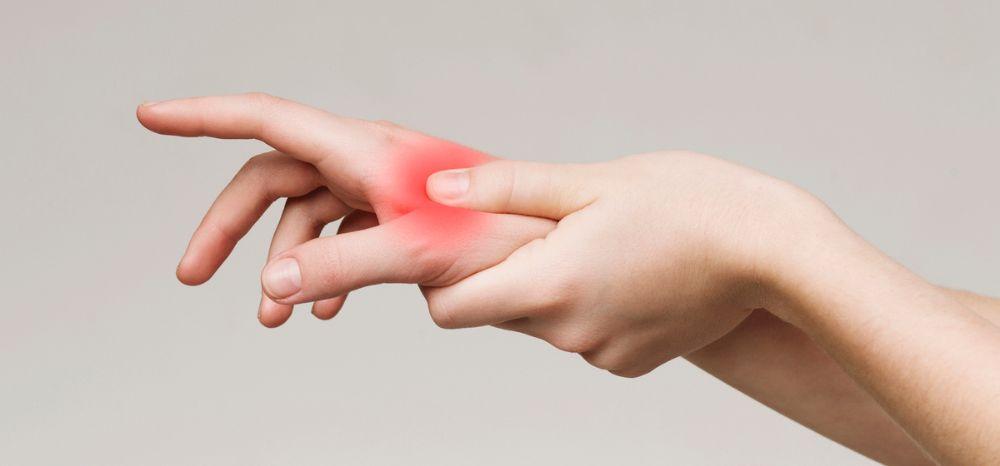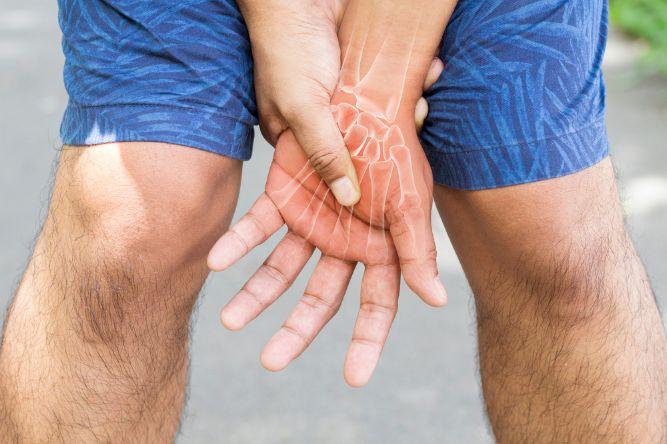Humans are one of the few species with opposable thumbs! Your hands and wrist are incredibly complex; they’re made up of intricate bones, tendons, and tissues, all working together to help you perform the work you do every day.
It’s hard to imagine your life without the use of your hands. You’re probably using them right now to hold your smartphone, take a sip of your coffee, or drum your fingers on the edge of the table.
Hands are more than just tools; they’re part of how you express yourself, from the gestures you use to make a point to the hugs you give to friends in need.
But what if your hand is injured? You could develop an injury in a matter of seconds, or it could take years of wear and tear before you notice symptoms.
Hand injuries are quite common. Carpal tunnel syndrome, for example, affects 1 to 3 people per 1000 in the United States.
After an acute injury or years of repetitive strain, an orthopedic surgeon can restore the function of your hands and reduce your pain. In this article, we’ll cover the most common hand surgeries, all of which we perform at Modern Orthopaedics of New Jersey:
What Is Hand Surgery?
The goal of hand surgery is not only to alleviate the patient’s pain and repair the functioning of their hand but to restore its appearance. For example, if a patient has severe burns on the hand, the surgeon will do everything they can to help the skin heal in a natural-looking way.
Surgical interventions are used to treat a wide range of wrist conditions and hand injuries, including:
- Bone breaks or severe burns
- Infections
- Arthritis
- Congenital disabilities
- Degenerative conditions
Given the great number of hand conditions, the surgeries performed to treat them are unique as well.
Who Needs Hand Surgery?
Do you need hand and wrist surgery? That’s a question only an orthopedic surgeon can answer. Even if you’re dealing with arthritis or a musculoskeletal issue, there may be other treatment options available to you before surgery is necessary.
Whether or not you need surgery will depend on how you respond to other treatments and the severity of your symptoms.
If you’re experiencing pain in your hands, you don’t necessarily need surgery. At Modern Orthopaedics of New Jersey, we specialize in providing surgical and non-surgical treatments for common conditions of the hand and wrist. When you schedule an appointment, we’ll take a close look at your hand to identify your treatment options.
The Different Types of Hand Surgery
Depending on your condition, your orthopedic physician may recommend any of the following surgeries:
Skin Grafts
A skin graft is when a surgeon takes healthy skin from another part of the body (the donor site) and attaches it to the damaged area. Healthy skin is typically taken from a part of the body that heals well, such as the thigh, upper arm, or buttocks.
Why might someone need a skin graft on their hand? The skin may be missing or damaged due to:
- Fingertip amputations and hand injuries
- Burn injury
- A bone break that damaged the skin
- Cancer
Your surgeon will take care to minimize any scarring that may result from the skin graft, ensuring that the skin will look as natural as possible. At first, the skin graft will be a different color than the surrounding skin; it may take 1-2 years for the appearance to settle entirely.
Skin Flaps
A successful skin graft depends on the condition of the tissue and blood vessels beneath the skin; if these parts aren’t healthy, the graft won’t succeed because the underlying tissue can’t deliver the blood supply needed.
Skin flaps are an option when a graft isn’t viable. With this procedure, the surgeon will remove the skin from the donor site that still has its own blood supply. The living tissue will include blood vessels, muscles, and fat tissue. This tissue will then be applied to the damaged area.
This surgery is used to treat severe burns, amputations, and injuries of the hands. It’s a way to repair skin after extensive tissue damage has taken place. Proper aftercare can help reduce scarring.
Carpal Tunnel Release
Carpal tunnel syndrome occurs when the median nerve (which extends from your arm into your hand) is compressed. The pressure may be caused by inflammation, trauma, and/or overuse.
This pressure results in the following symptoms, which increase in severity over time:
- Numbness
- Tingling (pins and needles)
- Weakness in the hand and difficulty with fine motor skills
- Burning sensation in the hands
If other treatment options prove ineffective (which include wrist braces and corticosteroid injections) and the patient’s symptoms persist, carpal tunnel release surgery may be recommended.
During this procedure, the surgeon will release the pressure bearing down on the median nerve by cutting through the tissue that surrounds the nerve. This makes more space for the nerves and tendons in the wrist.
Artificial Finger Joint Replacement
Each of your fingers is an essential part of your hand, and if one of your fingers becomes damaged, it can cause pain and inconvenience in your everyday life. With an artificial finger joint replacement surgery, you can restore the mobility of your finger joints.
If you’re suffering from arthritis or your finger joint is severely damaged, joint replacement surgery may be recommended. This is an operation where the damaged joint is removed and replaced with an artificial one, which is typically made out of metal or plastic.
The goal of this surgery is to give the patient a fully-functioning finger that no longer causes pain or stiffness.
Closed or Open Reduction and Fixation
How do you heal a broken arm or wrist?
A closed reduction is when the bones are realigned without making an incision. The doctor will physically maneuver the bones back in place without cutting into the skin.
On the other hand, an open reduction and fixation surgery is performed when an incision is necessary and the bones are surgically repositioned. The orthopedic surgeon may use pins or rods to secure the broken bones in a proper alignment (which will be removed at a later date).
Once the bones are secured in proper alignment, the healing process can begin.
Tendon Repair Surgery
The muscles in your arms attach to your bones through tendons, fibrous connective tissues that are incredibly strong. If the tendons in your hand and wrist are torn, cut, or injured, it impedes your hand and finger function. You may need hand surgery to repair the tendons.
At Modern Orthopaedics of New Jersey, we offer two types of tendon repair surgeries:
- Extensor tendon repair. A procedure that’s required after a tendon rupture or laceration. This should be performed soon after the injury takes place, which will increase the chances of a successful recovery. When repairing a laceration, the doctor may need to cleanse the wound to prevent infection and assess nerve damage. After the procedure is complete, the patient must follow post-operative instructions, including rehabilitation and dressing removal.
- Flexor tendon repair. This surgery is for ruptured flexor tendons in the fingers. It restores the function of the finger. As with the previous hand surgery, these injuries are time-sensitive; the sooner you can get your procedure, the better. Once the tendon is repaired, the doctor will put your hand in a splint to immobilize the fingers and relieve tension from the surgery site. Physical therapy is needed once the area heals.
Our hand surgery specialists will tailor your rehabilitation plan based on your unique injury and needs. In addition, we’ll be there to answer any questions you may have about your post-operative care.
Replantation Surgery
If part of the hand or finger has been severed from the body, replantation surgery is a way to reattach it. It’s an incredibly complex procedure, requiring state-of-the-art tools and expertise in hand surgery.
The goal of the surgery is to reattach the body part, restore its function, and prevent any pain the patient may experience when moving it. The orthopedic doctor will work meticulously to reattach every nerve ending and blood vessel.
Replantation surgery should be scheduled immediately after the injury takes place; the less time that elapses between the injury and the surgery, the more likely it is to succeed. The procedure may take several surgeries.
Fasciotomy
Compartment syndrome is a painful condition caused by swelling and pressure in the body (in this case, the hand). It may occur suddenly after an injury or slowly worsen over time.
After an injury, the pressure within the muscles may increase to the point where it impedes blood flow, causing a loss of function and damage to the tissues. Over time, the excess pressure can cut off blood and oxygen flow completely, leading to permanent damage.
During the procedure, your orthopedic surgeon will make an incision to release the pressure. They may also remove damaged tissue from the area. After that, the area should heal to resume normal functioning, including healthy blood flow and oxygen levels.
Trigger Finger Release
Do you ever experience a clicking or locking of your finger? If so, you may have trouble straightening the finger completely, or notice pain at the base of the finger. This is caused by a condition known as trigger finger. It’s when inflammation crowds the flexor tendon in the finger and causes the tendons to get stuck in the wrong position.
Before resorting to hand surgery, your orthopedic doctor will try to treat the issue using two corticosteroid injections, which should bring down the inflammation. If those aren’t successful, they may recommend surgery.
At our office, we perform percutaneous trigger finger releases. It’s a hand surgery where we administer local anesthesia to the patient. Then, we make a small hole in the skin and use it to cut and release the pulley that’s getting stuck. After that, a compressive dressing is placed over the finger. We encourage patients to test their finger and ensure it no longer gets caught immediately after the procedure.
For more severe issues, we may recommend an open trigger finger release surgery, which is performed at a hospital.
Wrist Joint Replacement
The bones in your wrist may eventually wear out as the bones rub against each other. When wrist pain doesn’t respond to other treatments, surgery may be advised. Also known as wrist arthroscopy, this is a procedure where a patient’s damaged wrist joint is replaced with an artificial one. The doctor will remove a damaged wrist bone and replace it with a prosthetic one.
The intent of this surgery is to decrease pain associated with wrist movements. A wrist joint replacement may be necessary following an injury, infection, or degeneration caused by arthritis.
Wrist Ligament Reconstruction
The fine bones in your wrist are held together and connected to your hand through your wrist ligaments. But if the wrist ligaments are stretched, torn, or otherwise injured, moving your wrist may cause severe pain.
The wrist can become swollen, limiting your ability to move it. Left untreated, the ligament damage could lead to the development of severe arthritis.
Those ligaments can be repaired through this reconstructive surgery; a minimally invasive procedure that repairs ligaments so that patients can once again move their wrists without pain.
Risks Associated With Hand Surgery
Should you be worried about hand surgery? There are risks involved with any surgery, and hand surgery is no exception. Before you consider surgery, we advise you to discuss these risks in detail with your orthopedic doctor.
Depending on the type of surgery you get, you may be at risk of the following complications:
- Blood clots
- Infections
- Numbness
- Loss of movement in the hand or wrist area
To minimize the risk of complications, be sure to follow the post-operative care instructions given to you by your doctor. And if you’re concerned you may be developing symptoms, call your doctor right away.
Do You Need Hand Surgery?
Are you dealing with a hand injury or concerned you may have developed a condition? When you visit Modern Orthopaedics of New Jersey, our hand specialists will assess your hand, and customize your treatment to meet your needs.
A strong doctor-patient relationship is at the core of everything we do. We go above and beyond to ensure you get excellent care, from your first appointment to post-operative follow-ups.
Along with hand surgeries, we also perform joint replacement surgery, rotator cuff tear treatment, pediatric orthopedics, and more.
Restore the function of your hands and live your life pain-free. Schedule an appointment with our orthopaedic surgeons in Wayne, New Jersey today!



